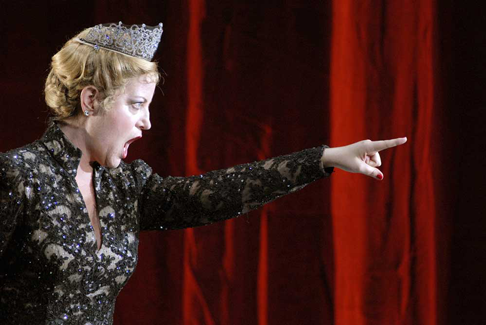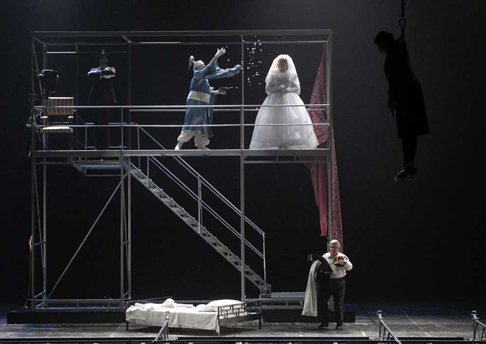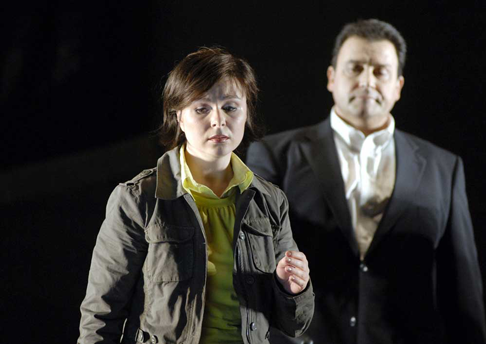![Scene from Turandot [Photo by Deutsche Oper Berlin]](http://www.operatoday.com/Turandot_01.png)
23 Oct 2008
Turandot without the trimmings
In recent years it’s the headgear of the ice-hearted princess that is often the major source of awe and excitement in productions of Puccini’s incomplete final opera.
English Touring Opera are delighted to announce a season of lyric monodramas to tour nationally from October to December. The season features music for solo singer and piano by Argento, Britten, Tippett and Shostakovich with a bold and inventive approach to making opera during social distancing.
This tenth of ten Live from London concerts was in fact a recorded live performance from California. It was no less enjoyable for that, and it was also uplifting to learn that this wasn’t in fact the ‘last’ LfL event that we will be able to enjoy, courtesy of VOCES8 and their fellow vocal ensembles (more below …).
Ever since Wigmore Hall announced their superb series of autumn concerts, all streamed live and available free of charge, I’d been looking forward to this song recital by Ian Bostridge and Imogen Cooper.
The Sixteen continues its exploration of Henry Purcell’s Welcome Songs for Charles II. As with Robert King’s pioneering Purcell series begun over thirty years ago for Hyperion, Harry Christophers is recording two Welcome Songs per disc.
Although Stile Antico’s programme article for their Live from London recital introduced their selection from the many treasures of the English Renaissance in the context of the theological debates and upheavals of the Tudor and Elizabethan years, their performance was more evocative of private chamber music than of public liturgy.
In February this year, Albanian soprano Ermonela Jaho made a highly lauded debut recital at Wigmore Hall - a concert which both celebrated Opera Rara’s 50th anniversary and honoured the career of the Italian soprano Rosina Storchio (1872-1945), the star of verismo who created the title roles in Leoncavallo’s La bohème and Zazà, Mascagni’s Lodoletta and Puccini’s Madama Butterfly.
Evidently, face masks don’t stifle appreciative “Bravo!”s. And, reducing audience numbers doesn’t lower the volume of such acclamations. For, the audience at Wigmore Hall gave soprano Elizabeth Llewellyn and pianist Simon Lepper a greatly deserved warm reception and hearty response following this lunchtime recital of late-Romantic song.
Collapsology. Or, perhaps we should use the French word ‘Collapsologie’ because this is a transdisciplinary idea pretty much advocated by a series of French theorists - and apparently, mostly French theorists. It in essence focuses on the imminent collapse of modern society and all its layers - a series of escalating crises on a global scale: environmental, economic, geopolitical, governmental; the list is extensive.
For this week’s Live from London vocal recital we moved from the home of VOCES8, St Anne and St Agnes in the City of London, to Kings Place, where The Sixteen - who have been associate artists at the venue for some time - presented a programme of music and words bound together by the theme of ‘reflection’.
'Such is your divine Disposation that both you excellently understand, and royally entertaine the Exercise of Musicke.’
Amongst an avalanche of new Mahler recordings appearing at the moment (Das Lied von der Erde seems to be the most favoured, with three) this 1991 Mahler Second from the 2nd Kassel MahlerFest is one of the more interesting releases.
‘And there was war in heaven: Michael and his angels fought against the dragon; and the dragon fought and his angels, And prevailed not; neither was their place found any more in heaven … that old serpent … Satan, which deceiveth the whole world: he was cast out into the earth, and his angels were cast out with him.’
If there is one myth, it seems believed by some people today, that probably needs shattering it is that post-war recordings or performances of Wagner operas were always of exceptional quality. This 1949 Hamburg Tristan und Isolde is one of those recordings - though quite who is to blame for its many problems takes quite some unearthing.
There was never any doubt that the fifth of the twelve Met Stars Live in Concert broadcasts was going to be a palpably intense and vivid event, as well as a musically stunning and theatrically enervating experience.
‘Love’ was the theme for this Live from London performance by Apollo5. Given the complexity and diversity of that human emotion, and Apollo5’s reputation for versatility and diverse repertoire, ranging from Renaissance choral music to jazz, from contemporary classical works to popular song, it was no surprise that their programme spanned 500 years and several musical styles.
The Academy of St Martin in the Fields have titled their autumn series of eight concerts - which are taking place at 5pm and 7.30pm on two Saturdays each month at their home venue in Trafalgar Square, and being filmed for streaming the following Thursday - ‘re:connect’.
The London Symphony Orchestra opened their Autumn 2020 season with a homage to Oliver Knussen, who died at the age of 66 in July 2018. The programme traced a national musical lineage through the twentieth century, from Britten to Knussen, on to Mark-Anthony Turnage, and entwining the LSO and Rattle too.
With the Live from London digital vocal festival entering the second half of the series, the festival’s host, VOCES8, returned to their home at St Annes and St Agnes in the City of London to present a sequence of ‘Choral Dances’ - vocal music inspired by dance, embracing diverse genres from the Renaissance madrigal to swing jazz.
Just a few unison string wriggles from the opening of Mozart’s overture to Le nozze di Figaro are enough to make any opera-lover perch on the edge of their seat, in excited anticipation of the drama in music to come, so there could be no other curtain-raiser for this Gala Concert at the Royal Opera House, the latest instalment from ‘their House’ to ‘our houses’.
"Before the ending of the day, creator of all things, we pray that, with your accustomed mercy, you may watch over us."
![Scene from Turandot [Photo by Deutsche Oper Berlin]](http://www.operatoday.com/Turandot_01.png)
In recent years it’s the headgear of the ice-hearted princess that is often the major source of awe and excitement in productions of Puccini’s incomplete final opera.
Thus the Turandot staging new at Berlin’s Deutsche Oper this season is an eye-opener of quite another kind: Turandot make her entrance dressed in black from head to toe and with face veiled. She mourns the injustice of earlier generations that continues to dominate life in the undefined present, in which Lorenzo Fioroni has set the production.
With a minimalist single set by Paul Zoller Fiorini makes Turandot, performed with Franco Alfari’s long-traditional conclusion, a play-within-a-play, and it’s the people who — as in German Expressionist drama of a century ago — are the downtrodden mass hero of the story as he tells it. Aged Emperor Altoumi and his partners in power look down on the stage from a director’s box high on the rear wall. The people, clad in Goodwill-type glad rags, sit as spectators in rows of folding chairs facing the audience.
The bloodletting of repeated beheadings is the opium with which Altoumi manipulates them and keeps them in line. They cry out for yet another head to role, unconscious of the cruelty and senseless abuse of power involved.
Turandot and Calaf engage in their riddle game seated eye-to-eye at a small table downstage. For Fioroni it’s a TV quiz game. Interesting, but does it make sense? It does — even if traditional Puccini fans no doubt miss at first the Orientalizing excesses of familiar stagings.
What is new — and the real eye-opener of Fioroni’s production is the double patricide that concludes it: Turandot and Calaf each cut down the father responsible for the generations of horror inflicted on their people.
Yes, yes, yes. Calaf’s father Timur was deposed somewhere along the line, presumably — it is always implied — due to great injustice. Here one feels that alcoholic Timur lost out rather because the other guy had more toys. When the chips are down and the play is over, Timur sit down at the side of the stage — back to audience — and takes out a bottle from his camel-hair coat.
Many who see Turandot are troubled — to be sure — by the torture and suicide of Liù, the only truly good person in the opera, for it is only she who knows what caritas, a truly selfless love, is. So is Fioroni, who suggests that with Liù Puccini composed himself into a corner and — unable to find a way out — left the opera unfinished. For him her sad fate hangs literally over the opera: her lifeless body is suspended above the stage in the hour of resolution.

“These are people caught up in boundless hysteria,” Fioroni writes in the exemplary program book of the Deutsche Oper. “None of them is in a position to see the situation with a clear eye.” How otherwise can Calaf witness Liù’s pain and still ruthlessly pursue an obsession that guarantees the continuation of the status quo? At the risk of sounding sit-com, can her meaningless death nourish happy love forever after? To keep the audience thinking with him, Fioroni eschews a Broadway finale and has the chorus sing its final “big number” off stage.
Undisputed star of the October 18 cast was Mario Zhang who stepped in for an ailing Carlo Ventre as Calaf. The Canadian tenor sang the role at Dresden’s Semper Oper early in the year and was immediately engaged by other European companies. His rich and robust voice, employed with ease even at the most demanding moments, suggests that he could be the tenor the world waits for.
Lise Lindstrom, who laid the foundation of her career with regional companies of her native America, is a near-ideal Turandot. Tall and lean, she is happily free of the mannerisms that can bring this role close to parody — and, of course, Fioroni’s approach leaves no room for brightly painted feline fingernails. While Lindstrom’s somewhat metallic voice underscores Turandot’s initial frigidity, greater warmth would have been welcome later. Yet she sings with power and enviable accuracy in all ranges.

Without capitalizing on the sympathy that an audience always feels for Liù, Balkan soprano Inna Los is an especially strong presence in this cast. (Yet one cannot stop wishing that Fioroni had been able to make his point without her corpse on stage for such an extended period.)
Paata Burchuladze, the Timur of the evening and still a major bass on the international opera scene a decade ago, has clearly reached retirement age, while Peter Maus, Altoumi in the cast and veteran of many years with the Deutsche Oper, remains an impressive tenor.
Ping, Pang and Pong, well-oiled cogs in the wheels of power as Fioroni sees them, were satisfactorily sung by Nathan Meyers, Jörg Schörner and Paul Kaufmann.
While Zoller’s designs intelligently supported Fioroni’s concept, his video projections were more movie- than opera-house and detracted from the strong story line of the staging.
Attilio Tomassello conducted an ensemble that now ranks high among Berlin’s many large symphonic ensembles. The chorus was superbly rehearsed by William Spaulding.

“An end with horror,” says Thomas Mann following the murder of the dictatorial manipulator in “Mario and the Magician,” his psychological short-story study of Italy in the early days of Mussolini. “Yes, but a liberating end nonetheless,” he concludes. In this sense Fioroni liberates Turandot and Calaf and the people whom they will now lead from darkness into light.
This is a Turandot obviously to be taken seriously.
Wes Blomster